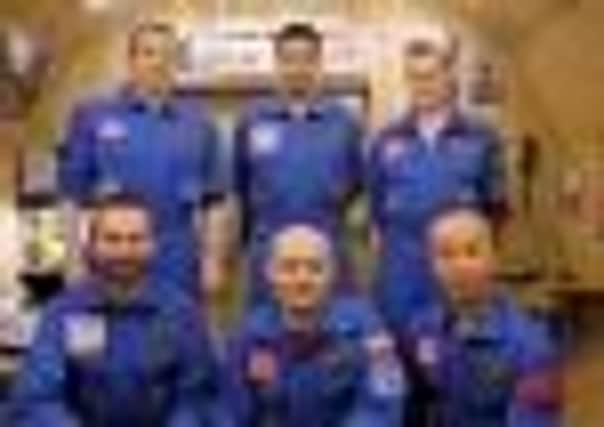The 520-day trip to Mars that ended in a Moscow car park


In what represents one small step for man, one giant leap for the imagination, a pioneering crew of international researchers yesterday completed their 520-day simulated mission to Mars.
Pale and drawn, the members of the six-man alliance nonetheless wore broad smiles as they emerged blinking into the daylight from a cluster of cramped, windowless steel capsules ensconced in a nondescript suburb of the Russian capital.
Advertisement
Hide AdAdvertisement
Hide AdFor nearly 75 weeks, the unlikely spacecraft had been their home during a mission scientists hope will prove invaluable when, one day, the 70 million-mile expedition becomes reality.
Frenchman Romain Charles, one of the Mars 500, said: “I really felt a physical distance between our crew and the people in mission control. I know that they’re just 20 metres away from us but my mind can’t accept it.”
Although their venture to the Red Planet never strayed far from Red Square, the party – which included three Russians, an Italian-Colombian and a Chinese – were denied earthly comforts in the attempt to replicate the arduous trek as authentically as possible.
Granted only sporadic e-mail contact with their loved ones, they were sustained by a bland diet of canned food ordinarily reserved for the denizens of the International Space Station. Urine and blood samples were a daily occurrence.
Their greatest challenge, however, in an unprecedented experiment designed to further mankind’s understanding of the universe, was learning to understand and tolerate one another. Previous tests had set acrimonious precedents. At the turn of the century, a Russian-led trial turned awry when, in a vodka-fuelled New Year’s Eve furore, a Canadian woman complained of being forcibly kissed by the Russian team captain, before a fistfight broke out between two crew members that left blood on the walls.
Although it was a strictly male-only, tee-total affair, the latest mission was not without its travails – boredom being chief among them.
Asked what advice he would give future Mars explorers to hold on to their sanity, Mr Charles said: “Always stay busy, don’t forget your ebook reader.”
Some of the men favoured solitary pursuits: China’s Wang Yue took up calligraphy, his Italian-Columbian crewmate, Diego Urbina, read the entire works of Gabriel Garcia Marquez, while Mr Charles perfected his skills on the guitar. He did so, he admitted, solely “to annoy the other guys”.
Advertisement
Hide AdAdvertisement
Hide AdOrganisers also ensured plenty of communal activities were near to hand to encourage interaction – along with a chessboard and a karaoke machine, the crew were given a Nintendo Wii, complete with a copy of the Guitar Hero game and a plastic drum kit.
“Time seems to have flown by since we closed the hatch last year,” said Igor Ushakov, the project’s leader. “But how time really felt to the crew we’ll soon know. Probably we’ll have a very big difference of opinion.”
Not that the entirety of the 520 days was given over to languid introspection. At a cost of £9.4 million, the Mars 500 experiment at Moscow’s Institute for Medical and Biological Problems sought to find value through a series of scientific tests.
The crew, who were free to leave the mission at any point, conducted a mock landing, venturing from their claustrophobic quarters in heavy space suits to trudge into a sand-covered room and plant the flags of Russia, China and the European Space Agency on the surface of the make-believe Mars.
They also took “samples” from the ground, conducted mock scientific experiments, and dealt with simulated emergencies aboard their vessel.
Such endeavours, the team believes, will smooth the course of a real flight to the arid, rocky planet, although such an undertaking remains decades away because of the huge costs and technological challenges involved, particularly the task of creating a compact and relatively lightweight shield that will protect the crew from space radiation.
For now, though, it is the story of the Mars pioneers that has captivated the world. As they were reacquainted with the outside world yesterday, the men dressed in regulation blue jumpsuits appeared proud and happy.
“We hope that we can help in designing the future missions to Mars,” said Mr Charles.
Advertisement
Hide AdAdvertisement
Hide AdMeanwhile, Mr Urbina, in a speech honed by months of isolation, said the crew felt proud to achieve the longest-ever imitation of space flight, so that “humankind can one day greet a new dawn on the surface of the distant but reachable planet”.
The crew will now spend three days in quarantine to minimise the risk of infection before holding a press conference.
To what extent the journey that never was has taken its toll on the voyagers may not become clear for days or even weeks.
One irony of their earthbound trip, according to experts, is that the psychological conditions could be even more taxing than those during a real flight, given that the crew was unable to experience any of the euphoria or dangers of actual space travel.
Come what may, it is clear that the men intend to use the £64,000 they each received to relax in more welcoming surroundings than a metal can.
Russian Alexey Sitev, who led the team into the quarters just a few weeks after getting married, said he had dreamed about going to the seaside with his bride, Ekaterina.
“I want to go somewhere to the warm sea as we have missed two summers here,” he said. “My thoughts are drifting toward swimming at sea and basking on warm sand.”